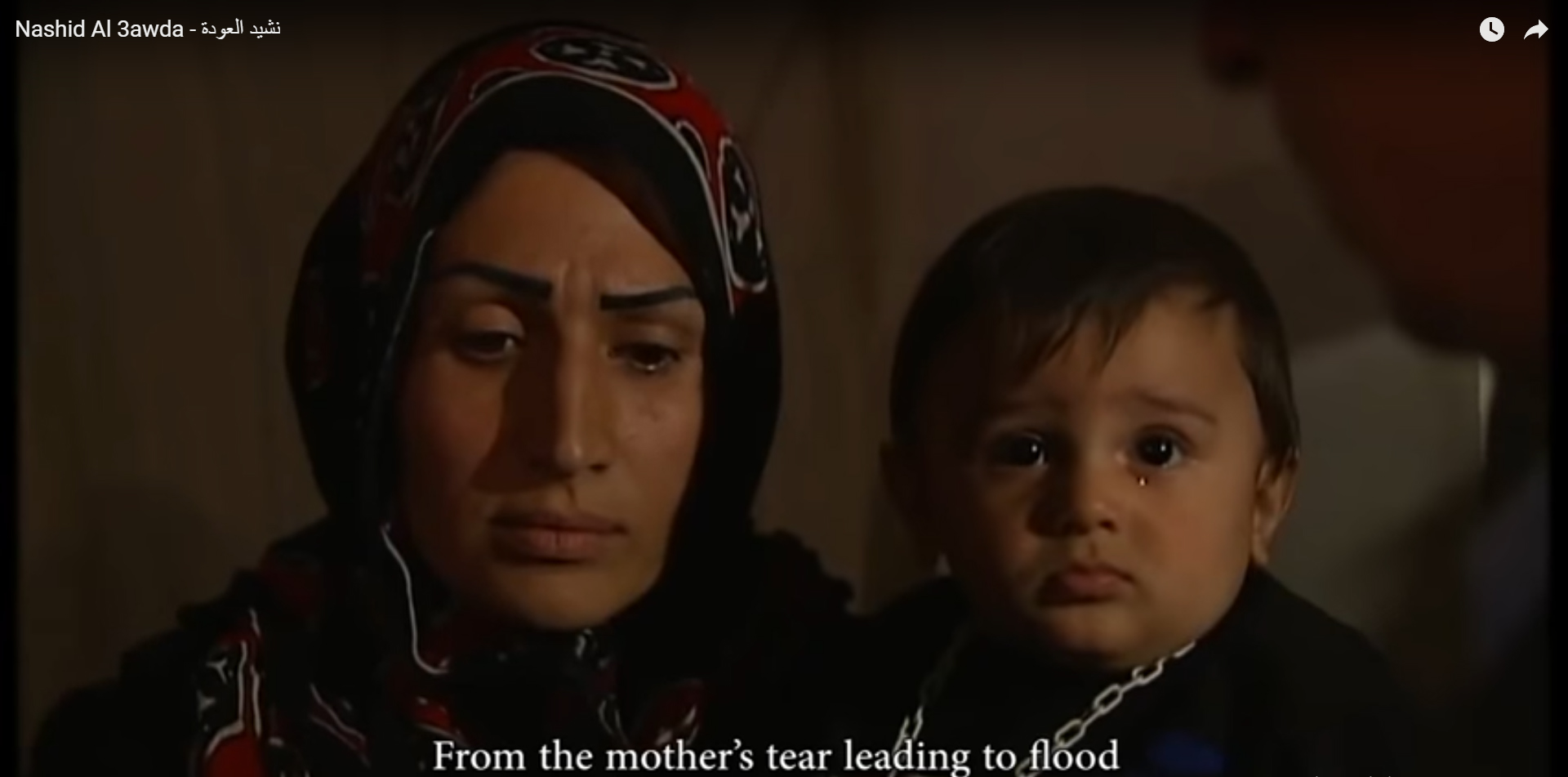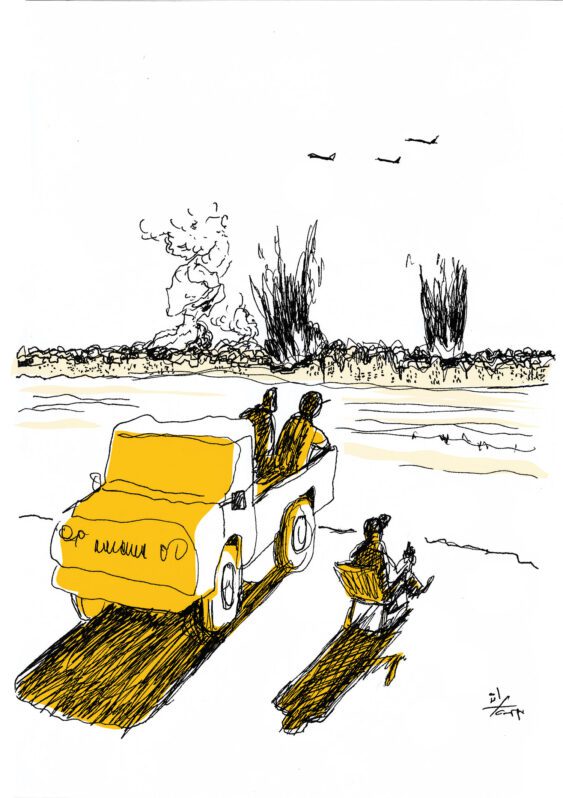Maronite League Sings for Syria: Anthem of Return is No Bridge of Return

If someone in Lebanon were to shut himself off from the outside world and listen for the first time to Anthem of Return (produced by the Maronite League, a Lebanese organization), he wouldn’t hesitate to say that it’s one of the songs advocating Palestinians’ right to reclaim their occupied land [given the eerie similarity of its theme and tone to Fairouz’s all-too-known ode to Palestinian hopes of return], the song Bridge of Return.
The melodramatic images accompanying the song [in its video clip] invoke the humanitarian situation in the Syrian war: mothers and children, the living and the dead, and devastation. These images are spliced with splendid images of the “Syrian land”; minarets mesh with the church, antiquities mesh with nature, destruction befalls all the while. The [on-screen] words are a literal translation of the song. And the song, although displaying the destruction and exploding bombs [that shows how unfit return might be], saw fit to be sung in the voice of the refugees. We, the Lebanese, are saying on behalf of the Syrians, “This is our land (a mosque, a citadel/church, a city carved in stone, then a mosque), our sun (archaeological sites crossed by sunrays), our air (a church), our field (a garden and a dome), our home (a residential area)”.
The song, which the League recently released in a conference it held on the topic of the return of the Syrian refugees to their country, seems like a throwback to the songs emphasizing the Palestinian right of return; a right stemming from the nature of the calamity that caused the refugee movement, namely the “settlement occupation”. Despite the obvious difference between the Palestinian and Syrian narratives, there are commonalities from the Lebanese perspective calling for the asylum to be ended, or ever more besieged; both civilian refugee movements followed or were associated with an armed, dominant military presence, i.e., the Palestinian Liberation Organization and the Syrian Arab Army. Hence, an old, intertwined trauma awoke within the League and brought back all the agitated discourses, among which the song is distinguished by harsh emotionalism. The song appropriates the voice [of the Syrian refugees] to put its own obsession –the “evacuation” of the Syrian refugees– at the top of the Syrian refugees’ list of priorities. That might have been “possible” or less surreal had the song been directed at the Palestinian refugees, for their legal besiegement [by Lebanese authorities] has mostly occurred in the name of [protecting] the “right of return”. This right is a Palestinian demand beyond the Lebanese context, a demand sung by Fairouz in one of the most famous literary tributes advocating for the Palestinian people. As for Syria, the ongoing war stands in the way of such a return.
After 1982, the Palestinian revolution left Lebanon, taking its weapons, its force, and its influence with it. The refugees –about 450,000 of them– remained in tin-roofed camps under a plethora of restrictions. A large percentage left Lebanon as soon as they could, while two words continue to frame the attempt to excuse the constrained life : “no naturalization” [of Palestinians in Lebanon]. A motto protecting the “right to return”. A Palestinian right that the Lebanese government’s discourse adopted so that it could besiege the refugees in the name of upholding it. Here, regarding Syria, the asylum demands not a right emanating from the United Nations, but an end to the war.
The Syrian war is a war within, not against, the Syrian presence in Syria. Expulsion is not the essence of the calamity, but one of the consequences of the war. The world is on Syria’s ground and in its sky: states, parties, throngs, armies, gods, and [all sorts of] calculations. Stopping the war would be the humanitarian demand if the Maronite League wanted to abate the battles of politics. Had it produced a song in this context, it would have more easily tapped into human solidarity, and raised a truthful voice in a merciless war. It would have also revealed its desire for the refugees to leave with glibness apparent to all, but it would not have caused astonishment like Anthem of Return. The return of most Syrian refugees here unable to return home in earnest are due to security concerns, not a lack of patriotism [as the song seems to insinuate].
There is no justification for this musical fervor in stressing that “the land is ours and the sky is our sky (while displaying a street and a car, then an archaeological site/Souq al-Hamidiyya packed with displays, then a restaurant in Bab Tuma); our children and grandchildren will not be content unless they live among us (while displaying children playing in a room in front of a television); No, we will not be homeless (while displaying children receiving aid); this is our right, we want our land (a statue in a square opposite Mount Qasioun)”. There is no justification for raising a wounded cry demanding “Let the world hear: No, No, No… we won’t be resigned, we won’t be resigned, we won’t be resigned”. The [choice of words is telling] because the hope among refugees is in resignation.
Whatever Lebanon’s position on the refugee situation, whatever falls upon the refugees, to put an aspiration that contradicts what the refugees desire from the asylum into their mouths, is neither sound nor convincing (let alone acceptable!). “We will not be resigned”, yet not being resigned hurts the refugee situation. This is more so given that mobilizing to insist on return as an established demand, as is the case with Palestinian refugees isn’t applicable here. In the Syrian case, we are all waiting for the armies of Syria, Iran, Russia, Saudi Arabia, Turkey, America, Europe –and the list goes on– to read fate. In Lebanon, people were waiting for the end of the Syrian war to adopt a president. Lebanon is not hosting the refugees with official papers and normalization, as is the case in Germany, for example. Lebanon is not even granting Syrian refugees residence permits that regulate the refugee movement, which would serve both sides. There is no need to panic and emphasize patriotism. Perhaps the disappearance of iron and fire from the nation’s sky will be more of a “resignation” for a large percentage of the refugees living in the tents. The song’s desire to be rich, nationalistic, and sensitive lodged its creators’ wishes in the eyes of the refugees, so the spectacle appeared confusing.
The song has barely been heard and no one is singing it. Confused between its purpose and its voice. But it delivered a message: You [refugees] yearn to leave us [Lebanese]. This is your dream. And how right you are to adhere to it. The song concludes with images of sad children, crying, covered with soot, the tents in Beqaa and North Lebanon, the makeshift community in front of the tents, veiled women, and a man with a headband and keffiyeh. Then there is a still image of a woman with a child and a sign saying “we want to go home”, which connects to the lesson written at the end of the video clip: “Return is a right and a duty”. Below the image is the Maronite League’s logo alongside the title “Syrian Refugees: The Path of Return/The National Conference on the Syrian Displacement”, and a picture of tents bearing the colors of the Syrian flag.
The League has dubbed the voice of the Syrian refugees. The [actual] Syrian voice speaks a thousand worthy demands at the moment, but the voice [in the song] has imposed upon it an obsession that silences all of them. At the time, Fairuz’s Bridge of Return complemented the Palestinian voice, and the Palestinian voice adopted it. As for Anthem of Return, it is redundant: Those rejecting the refugee presence do not need double intender to speak, and the situation of the refugees does not call for this song. The fact that one was by Fairouz and the other by the Maronite Union summarizes the whole difference.
Mapped through:
Articles, Asylum, Migration and Human Trafficking, Lebanon
Related Articles



